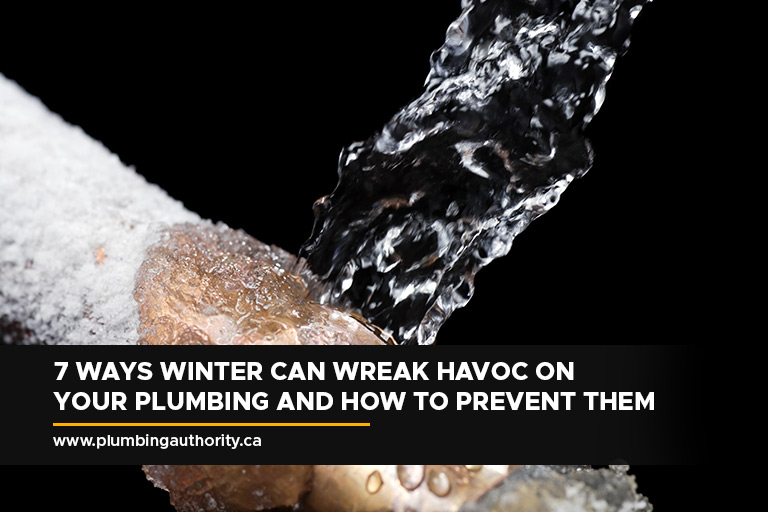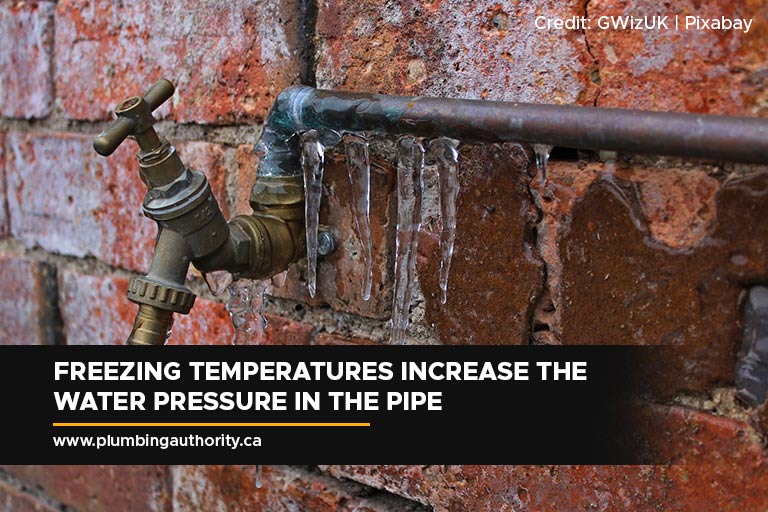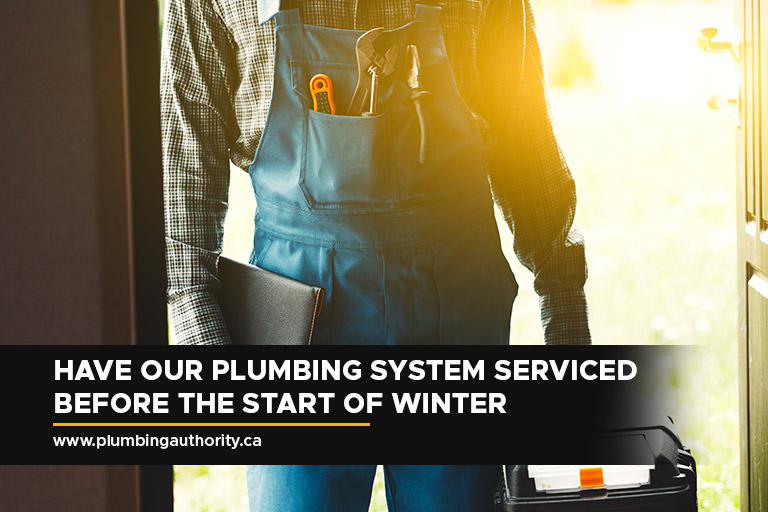
Frozen pipes are just one of the potential plumbing disasters you can experience during winter. Being proactive helps protect your home’s plumbing system from the devastating effects of winter. The earlier you act, the lesser you worry about unexpected winter plumbing issues.
How Winter Affects Your Plumbing System

Freezing temperatures increase the water pressure in the pipe
The freezing weather can subject Caledon residents to various plumbing problems in winter. When plumbing disasters arise, it causes homeowners to panic, trying to stop the problem and protect their property from significant and costly damage.
However, the cold temperature is not the only one to blame for plumbing problems. In winter, some homeowners tend to overlook the importance of winter-proofing their plumbing systems (pipes, water heaters, drains, and even basements), increasing the risk of leaking water lines, heater failures, burst pipes, clogged drains, and flooding.
Also, irregular plumbing maintenance and not addressing minor plumbing issues immediately can make your plumbing more vulnerable to freezing weather. With all the gift shopping, trips, and attending events, a winter plumbing disaster is the last thing you want to happen.
Understanding how devastating winter is can help you come up with effective preventive measures that will keep your plumbing well-protected all throughout the winter.
Common Winter Plumbing Problems and Plumbing Winterization Tips

Have our plumbing system serviced before the start of winter
Certain plumbing system troubles tend to pop up more often than others during the cold season. Knowing how to winterize a home plumbing system can save you from expensive structural damage. Here are the most common winter plumbing woes that can potentially occur and some winter plumbing tips on how to prevent them.
- Frozen Outdoor Pipes
Outdoor water lines can quickly freeze when exposed to freezing temperatures. Since these lines often go unused during the cold season, water forces itself to flow. Strong pressure can cause the pipe to crack or burst, resulting in a plumbing disaster.
Be proactive:
-
- Winterize your outdoor hose bibbs as early as the start of the fall season to protect them against the freezing winter temperature.
- Detach hoses from the faucet, drain the remaining water, and store them to avoid any damage. Turn off the valve on the water line that supplies the faucet. Open the hose bib valve to drain the remaining water and leave it open to reduce water pressure, especially when exposed to freezing temperatures. Also, make sure to protect the hose bibbs and water lines by installing an insulating cover.
- Upgrade the outdoor spigots to frost-free hose bibs. Installed at a downward angle, it allows water to drain automatically. It also features a water valve located near the home’s interior.
- Frozen Indoor Pipes
Pipes that supply water to your home, especially in uninsulated areas and along exterior walls, are also susceptible to freezing during the winter season. When frozen, the pipes can crack or burst, causing major water leaks and damage to the structure. Look out for signs of leaks under the sink and from showers. Another sign of a frozen pipe is non-existent water flow.
Be proactive:
-
- To prevent indoor pipes from freezing, leave the faucet on to allow it minimum dripping to reduce the pressure in the pipe and keep the water flowing.
- Leave cabinet doors under the sink open to enable heat from the home to circulate in the area.
- Insulate the water supply lines, especially the ones on the exterior walls and in uninsulated places in your house.
- Install pressure relief valves on water lines to prevent pressure buildup that can cause the pipe to leak and break during winter.
- Clogged Drains
With the holiday preparation and celebrations, the kitchen gets to work extra hard, especially the sinks. Disposing of more foods down the garbage disposal can increase the risk of clogged drains.
Be prepared:
-
- Avoid disposing of grease, fat, cooking oil, coffee grounds, meat bones, and fruit and vegetable peelings into the garbage disposal. Instead, transfer grease, fat, and cooking oil into a container and dispose of them properly. Throw other items that do not belong into the garbage disposal directly in the trash.
- Make it a habit to run cold water for 15 to 30 seconds when using the garbage disposal to move food waste through the drain.
- Run ice to clean the garbage disposal periodically. Use a stopper to cover the drain before turning on the disposal.
- Water Heater Problems
In winter, water heaters often experience heavier loads, especially when your home is filled with guests over the holidays. This causes the water heater to keep up with the demand. If the heater fails to provide warm water, you may need to call a plumbing technician.
Be proactive:
-
- Be sure to perform routine maintenance for your water heater. Tank water heater models need to be drained annually. Also, you need to check the pressure relief valve to ensure proper functioning.
- Retain heat by installing an insulation cover to the water supply inlet and hot water outlet pipes that run into and out of the water heating machine.
- To help conserve energy, install a water heater blanket to a tank water heater.
- Sump Pump Backup
Sump pumps are more likely to work overtime during winter due to melting snow and ice. This increases the risk of sump pump backup in the winter due to clogs or freezing.
Be proactive:
-
- Be sure to maintain your sump pump as early as fall. Remove the debris and grime in the sump pit to prevent clogs.
- Test the sump pump regularly throughout the winter months.
- Protect the pit and pipes of the sump pump from freezing by keeping the heat on in the basement.
- Keep the heat on in basements where sump pumps are located to prevent the pit and pipes from freezing.
- In addition to redirecting water away from the foundation of the home, you can install outdoor drainage and reroute gutter drains to help reduce the load on your sump pump.
- Check and remove debris from the intake and discharge line to prevent blockage. You can also install an insulation cover to protect the lines against freezing.
- Frozen Septic Lines
Septic lines and tanks are vulnerable to freezing when they are not well-protected by soil coverage. This causes the main water line that connects the home’s main line that runs from your home’s main drain to the septic tank to freeze, which causes the home’s drainage system to stop working. It also freezes the content, causing the wastewater to back up. Contact a septic tank repair immediately to avoid damage and contamination of the water supply.
Be proactive:
-
- Before the start of the cold season, take time to assess the area where the septic system is to determine potential soil erosion. Be sure to add more soil to the eroded area to provide better insulation to septic lines. However, never compress the soil as it can freeze the soil quickly.
- Add a layer of straw over the area to increase winter protection for your septic system.
- Be sure to call a septic technician to pump the tank before winter to get rid of waste and prevent freezing.
- Conserve water and limit the use of garbage disposal to lessen the burden of the septic system during the winter. Flushing the septic system regularly and adding heat helps prevent nasty septic tank problems.
For emergency plumbing repairs, call a licensed plumber in Caledon at 647-992-PIPE (7473). Plumbing Authority is here to address and resolve all plumbing problems 24 hours a day, 7 days a week.




